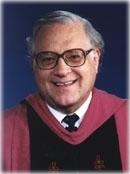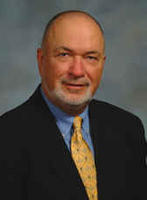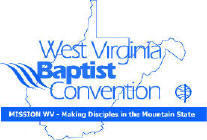 I'm always on the lookout for good succinct articles on the Trinity, and ran across the excellent article by John Piper. Enjoy.--Glenn
I'm always on the lookout for good succinct articles on the Trinity, and ran across the excellent article by John Piper. Enjoy.--GlennWhat is the Doctrine of the Trinity?
The doctrine of the Trinity means that there is one God who eternally exists as three distinct Persons--the Father, Son, and Holy Spirit. Stated differently, God is one in essence and three in person. These definitions express three crucial truths: (1) The Father, Son, and Holy Spirit are distinct Persons, (2) each Person is fully God, (3) there is only one God.
The Father, Son, and Holy Spirit are distinct Persons. The Bible speaks of the Father as God (Phil. 1:2), the Jesus as God (Titus 2:13), and the Holy Spirit as God (Acts 5:3-4). Are these just three different ways of looking at God, or simply ways of referring to three different roles that God plays?
The answer must be no, because the Bible also indicates that the Father, Son, and Holy Spirit are distinct Persons. For example, since the Father sent the Son into the world (John 3:16), He cannot be the same person as the Son. Likewise, after the Son returned to the Father (John 16:10), the Father and the Son sent the Holy Spirit into the world (John 14:26; Acts 2:33). Therefore, the Holy Spirit must be distinct from the Father and the Son.
In the baptism of Jesus, we see the Father speaking from heaven and the Spirit descending from heaven in the form of a dove as Jesus comes out of the water (Mark 1:10-11). In John 1:1 it is affirmed that Jesus is God and, at the same time, that He was "with God"--thereby indicating that Jesus is a distinct Person from God the Father (cf. also 1:18). And in John 16:13-15 we see that although there is a close unity between them all, the Holy Spirit is also distinct from the Father and the Son.
The fact that the Father, Son, and Holy Spirit are distinct Persons means, in other words, that the Father is not the Son, the Son is not the Holy Spirit, and the Holy Spirit is not the Father. Jesus is God, but He is not the Father or the Holy Spirit. The Holy Spirit is God, but He is not the Son or the Father. They are different Persons, not three different ways of looking at God.
The personhood of each member of the Trinity means that each Person has a distinct center of consciousness. Thus, they relate to each other personally--the Father regards Himself as "I," while He regards the Son and Holy Spirit as "You." Likewise the Son regards Himself as "I," but the Son and the Holy Spirit as "You."
Often it is objected that "If Jesus is God, then he must have prayed to himself while he was on earth." But the answer to this objection lies in simply applying what we have already seen. While Jesus and the Father are both God, they are different Persons. Thus, Jesus prayed to God the Father without praying to Himself. In fact, it is precisely the continuing dialog between the Father and the Son (Matthew 3:17; 17:5; John 5:19; 11:41-42; 17:1ff) which furnishes the best evidence that they are distinct Persons with distinct centers of consciousness.
Sometimes the Personhood of the Father and Son is appreciated, but the Personhood of the Holy Spirit is neglected. Sometimes the Spirit is treated more like a "force" than a person. But the Holy Spirit is not an it, but a He (see John 14:26; 16:7-15; Acts 8:16). The fact that the Holy Spirit is a Person, not an impersonal force (like gravity), is also shown by the fact that He speaks (Hebrews 3:7), reasons (Acts 15:28), thinks and understands (1 Corinthians 2:10-11), wills (1 Corinthians 12:11), feels (Ephesians 4:30), and gives personal fellowship (2 Corinthians 13:14). These are all qualities of personhood. In addition to these texts, the others we mentioned above make clear that the Personhood of the Holy Spirit is distinct from the Personhood of the Son and the Father. They are three real persons, not three roles God plays.
Another serious error people have made is to think that the Father became the Son, who then became the Holy Spirit. Contrary to this, the passages we have seen imply that God always was and always will be three Persons. There was never a time when one of the Persons of the Godhead did not exist. They are all eternal.
While the three members of the Trinity are distinct, this does not mean that any is inferior to the other. Instead, they are all identical in attributes. They are equal in power, love, mercy, justice, holiness, knowledge, and all other qualities.
Each Person is fully God. If God is three Persons, does this mean that each Person is "one-third" of God? Does the Trinity mean that God is divided into three parts?
The Trinity does not divide God into three parts. The Bible is clear that all three Persons are each one hundred percent God. The Father, Son, and Holy Spirit are all fully God. For example, it says of Christ that "in Him all the fullness of Deity dwells in bodily form" (Colossians 2:9). We should not think of God as like a "pie" cut into three pieces, each piece representing a Person. This would make each Person less than fully God and thus not God at all. Rather, "the being of each Person is equal to the whole being of God." The divine essence is not something that is divided between the three persons, but is fully in all three persons without being divided into "parts."
Thus, the Son is not one-third of the being of God, He is all of the being of God. The Father is not one-third of the being of God, He is all of the being of God. And likewise with the Holy Spirit. Thus, as Wayne Grudem writes, "When we speak of the Father, Son, and Holy Spirit together we are not speaking of any greater being than when we speak of the Father alone, the Son alone, or the Holy Spirit alone."
There is only one God. If each Person of the Trinity is distinct and yet fully God, then should we conclude that there is more than one God? Obviously we cannot, for Scripture is clear that there is only one God: "There is no other God besides me, a righteous God and a Savior; there is none besides me. Turn to me and be saved, all the ends of the earth! For I am God, and there is no other" (Isaiah 45:21-22; see also 44:6-8; Exodus 15:11; Deuteronomy 4:35; 6:4-5; 32:39; 1 Samuel 2:2; 1 Kings 8:60).
Having seen that the Father, the Son, and the Holy Spirit are distinct Persons, that they are each fully God, and that there is nonetheless only one God, we must conclude that all three Persons are the same God. In other words, there is one God who exists as three distinct Persons.
If there is one passage which most clearly brings all of this together, it is Matthew 28:19: "Go therefore and make disciples of all the nations, baptizing them in the name of the Father and the Son and the Holy Spirit." First, notice that the Father, Son, and Holy Spirit are distinguished as distinct Persons. We baptize into the name of the Father and the Son and the Holy Spirit. Second, notice that each Person must be deity because they are all placed on the same level. In fact, would Jesus have us baptize in the name of a mere creature? Surely not. Therefore each of the Persons into whose name we are to be baptized must be deity. Third, notice that although the three divine Persons are distinct, we are baptized into their name (singular), not names (plural). The three Persons are distinct, yet only constitute one name. This can only be if they share one essence.
Is the Trinity Contradictory?
This leads us to investigate more closely a very helpful definition of the Trinity which I mentioned earlier: God is one in essence, but three in Person. This formulation can show us why there are not three Gods, and why the Trinity is not a contradiction.
In order for something to be contradictory, it must violate the law of noncontradiction. This law states that A cannot be both A (what it is) and non-A (what it is not) at the same time and in the same relationship. In other words, you have contradicted yourself if you affirm and deny the same statement. For example, if I say that the moon is made entirely of cheese but then also say that the moon is not made entirely of cheese, I have contradicted myself.
Other statements may at first seem contradictory but are really not. Theologian R. C. Sproul cites as an example Dickens' famous line, "It was the best of times, it was the worst of times." Obviously this is a contradiction if Dickens means that it was the best of times in the same way that it was the worst of times. But he avoids contradiction with this statement because he means that in one sense it was the best of times, but in another sense it was the worst of times.
Carrying this concept over to the Trinity, it is not a contradiction for God to be both three and one because He is not three and one in the same way. He is three in a different way than He is one. Thus, we are not speaking with a forked tongue-we are not saying that God is one and then denying that He is one by saying that He is three. This is very important: God is one and three at the same time, but not in the same way.
How is God one? He is one in essence. How is God three? He is three in person. Essence and person are not the same thing. God is one in a certain way (essence) and three in a different way (person). Since God is one in a different way than He is three, the Trinity is not a contradiction. There would only be a contradiction if we said that God is three in the same way that He is one.
So a closer look at the fact that God is one in essence but three in person has helped to show why the Trinity is not a contradiction. But how does it show us why there is only one God instead of three? It is very simple: All three Persons are one God because, as we saw above, they are all the same essence. Essence means the same thing as "being." Thus, since God is only one essence, He is only one being--not three. This should make it clear why it is so important to understand that all three Persons are the same essence. For if we deny this, we have denied God's unity and affirmed that there is more than one being of God (i.e., that there is more than one God).
What we have seen so far provides a good basic understanding of the Trinity. But it is possible to go deeper. If we can understand more precisely what is meant by essence and person, how these two terms differ, and how they relate, we will then have a more complete understanding of the Trinity.
Essence and Person
Essence. What does essence mean? As I said earlier, it means the same thing as being. God's essence is His being. To be even more precise, essence is what you are. At the risk of sounding too physical, essence can be understood as the "stuff" that you "consist of." Of course we are speaking by analogy here, for we cannot understand this in a physical way about God. "God is spirit" (John 4:24). Further, we clearly should not think of God as "consisting of" anything other than divinity. The "substance" of God is God, not a bunch of "ingredients" that taken together yield deity.
Person. In regards to the Trinity, we use the term "Person" differently than we generally use it in everyday life. Therefore it is often difficult to have a concrete definition of Person as we use it in regards to the Trinity. What we do not mean by Person is an "independent individual" in the sense that both I and another human are separate, independent individuals who can exist apart from one another.
What we do mean by Person is something that regards himself as "I" and others as "You." So the Father, for example, is a different Person from the Son because He regards the Son as a "You," even though He regards Himself as "I." Thus, in regards to the Trinity, we can say that "Person" means a distinct subject which regards Himself as an "I" and the other two as a "You." These distinct subjects are not a division within the being of God, but "a form of personal existence other than a difference in being."
How do they relate? The relationship between essence and Person, then, is as follows. Within God's one, undivided being is an "unfolding" into three personal distinctions. These personal distinctions are modes of existence within the divine being, but are not divisions of the divine being. They are personal forms of existence other than a difference in being. The late theologian Herman Bavinck has stated something very helpful at this point: "The persons are modes of existence within the being; accordingly, the Persons differ among themselves as the one mode of existence differs from the other, and--using a common illustration-as the open palm differs from a closed fist."
Because each of these "forms of existence" are relational (and thus are Persons), they are each a distinct center of consciousness, with each center of consciousness regarding Himself as "I" and the others as "You." Nonetheless, these three Persons all "consist of" the same "stuff" (that is, the same "what," or essence). As some have explained it, while essence is what you are, person is who you are. So God is one "what" but three "whos."
The divine essence is thus not something that exists "above" or separate from the three Persons, but the divine essence is the being of the three Persons. Neither should we think of the Persons as being defined by attributes added on to the being of God. Wayne Grudem explains:
But if each person is fully God and has all of God's being, then we also should not think that the personal distinctions are any kind of additional attributes added on to the being of God . . . Rather, each person of the Trinity has all of the attributes of God, and no one Person has any attributes that are not possessed by the others. On the other hand, we must say that the Persons are real, that they are not just different ways of looking at the one being of God...the only way it seems possible to do this is to say that the distinction between the persons is not a difference of `being' but a difference of `relationships.' This is something far removed from our human experience, where every different human `person' is a different being as well. Somehow God's being is so much greater than ours that within his one undivided being there can be an unfolding into interpersonal relationships, so that there can be three distinct persons.
Trinitarian Illustrations?
There are many illustrations which have been offered to help us understand the Trinity. While there are some illustrations which are helpful, we should recognize that no illustration is perfect. Unfortunately, there are many illustrations which are not simply imperfect, but in error. One illustration to beware of is the one which says "I am one person, but I am a student, son, and brother. This explains how God can be both one and three." The problem with this is that it reflects a heresy called modalism. God is not one person who plays three different roles, as this illustration suggests. He is one Being in three Persons (centers of consciousness), not merely three roles. This analogy ignores the personal distinctions within God and mitigates them to mere roles.
Application
Why is it important to understand what it means to worship a triune God? The Trinity is first of all important because God is important. To understand more fully what God is like is a way of honoring God. Further, we should allow the fact that God is triune to deepen our worship. We exist to worship God. And God seeks people to worship Him in "spirit and truth" (John 4:24). Therefore we must always endeavor to deepen our worship of God--in truth as well as in our hearts.
The Trinity also has a very significant application to prayer. The general pattern of prayer in the Bible is to pray to the Father through the Son and in the Holy Spirit (Ephesians 2:18). Our fellowship with God should be enhanced by consciously knowing that we are relating to a tri-personal God!
Awareness of the distinct role that each Person of the Trinity has in our salvation can especially serve to give us greater comfort and appreciation for God in our prayers, as well as helping us to be specific in directing our prayers. Nonetheless, while recognizing the distinct roles that each Person has, we should never think of their roles as so separate that the other Persons are not involved. Rather, everything that one Person is involved in, the other two are also involved in, one way or another.
Summary
To summarize:
1. The Trinity is not belief in three gods. There is only one God.
2. This one God exists as three Persons.
3. The three Persons are not each a part of God, but are each fully God and equally God. Within God's one undivided being there is an unfolding into three interpersonal relationships such that there are three Persons. The distinctions within the Godhead are not distinctions of His essence and neither are they something added on to His essence, but they are the unfolding of God's one, undivided being into three interpersonal relationships such that there are three real Persons.
4. God is not one person who took three consecutive roles. That is the heresy of modalism. The Father did not become the Son and then the Holy Spirit. Instead, there have always been and always will be three distinct persons in the Godhead.
5. The Trinity is not a contradiction because God is not three in the same way that He is one. God is one in essence, three in Person.
Source: http://www.desiringgod.org/library/theological_qa/trinity_incarnation/trinity.html














